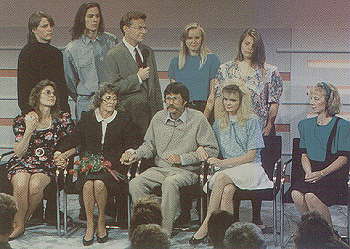Gun Culture
“A well regulated Militia, being necessary to the security of a free State, the right of the people to keep and bear Arms, shall not be infringed.”
U.S. Constitution: Second Amendment
First, it’s free speech. Then – before anything about fair trials or unreasonable searches – it’s the right to bear arms. Thus wrote the founding fathers of the country in which I now live, and that’s why, more than two centuries later, I was at the Arizona State Fairgrounds, in the presence of more firearms than I had ever seen in my life before. And that includes the time spent watching John Woo movies.
As a Briton, I find myself vaguely troubled by the free availability of weaponry. We do very well without it in Britain, with our unarmed bobbies, and have a much lower murder rate there (and would you like a cup of tea?). However, in America, you’re much more likely to find your mugger or burglar has a gun, and the best defense against that…is a bigger gun. Which is where the gun shows come in, letting anyone with a driving licence – and I suspect even that would probably be superfluous for the private sales taking place at the fair – and money accumulate sufficient firepower to re-enact Columbine, Dunblane and Hungerford.
They say an armed society is a polite society, and certainly, an armed show is a polite show – despite the crowds, I’ve never heard “Excuse me” and “No, after you” used with such frequency. The guns were perhaps the least interesting things on display since, hey, you’ve seen one revolver, you’ve seen ’em all. I was more interested in the stuff around the edges, some of which was fascinating, some of which was, frankly, disturbing.
On the one hand, you could buy copies of the American consitution, and targets with Osama Bin Laden’s face on them, things which celebrated America, and all that’s good about it (the first amendment, for example, the one about freedom of speech). On the other hand, you could buy copies of Mein Kampf and even letters from inmates at Dachau. Those interested in owning that kind of shit are the sort of people who really should not be permitted to own weapons.
But yet, this is the dilemma. Who am I to judge who should and should not have the right to bear arms? There’s really no difference from censorship, where someone else says what you have the right to watch. As a firm believer in everyone taking responsibility for the consequences of their actions, people should have the right to own guns – but if they abuse that right, then the full weight of the law should come down on them immediately. Yet, with so many guns around, how do you keep them out of the grasp of criminals? Laws aren’t really the answer for those who have shown themselves happy to break them.
Part of me feels sure that if the founding fathers were writing today, they’d not be quite so liberal. Perhaps therein lies the solution: you get to have any weapon you like – as long as it was available in 1789. I think at the very least, we’d see a drop in the numbers of drive-by musketings.


